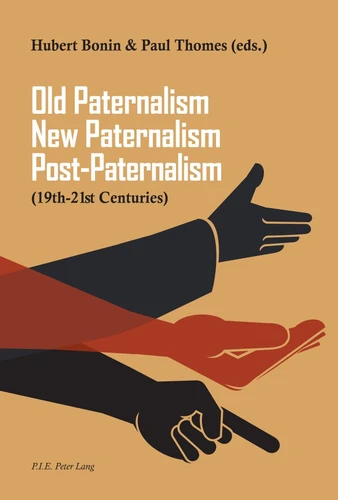Old Paternalism, New Paternalism, Post-Paternalism. (19th–21st Centuries)
Par : ,Formats :
- Paiement en ligne :
- Livraison à domicile ou en point Mondial Relay indisponible
- Retrait Click and Collect en magasin gratuit
- Nombre de pages407
- PrésentationBroché
- Poids0.547 kg
- Dimensions22,0 cm × 15,0 cm × 2,1 cm
- ISBN978-2-87574-033-5
- EAN9782875740335
- Date de parution25/09/2009
- CollectionPLG.HUMANITIES
- ÉditeurPeter Lang AG
Résumé
The aim of this book is to explore and compare the welfare strategies of businesses, including the various forms of "paternalism", over two centuries and across a number of countries. Specifically, the book examines differentiation and variation among the social mindsets of companies. Business history inevitably involves the study of social policies, including analysis of the societal influence of companies and their response to workforce demands concerning living conditions.
In this book, historical forms of patronage are considered (old paternalism), as well as structured social policies aimed at stabilizing and appeasing labour relations (new paternalism). Issues of "post-paternalism" are then studied, opening the door to an assessment of the differences between the various types of paternalism and an exploration of the "fad" of corporate social responsibility (CSR) or corporate social entrepreneurship (CSE).
This concept, which gained prominence among transnational companies around the turn of the 1980s and the beginning of the third industrial revolution, involved the design of an entrepreneurial strategy to identify, analyse, organise, create and manage a venture to initiate sustainable and systematic socio-economic change.
In this book, historical forms of patronage are considered (old paternalism), as well as structured social policies aimed at stabilizing and appeasing labour relations (new paternalism). Issues of "post-paternalism" are then studied, opening the door to an assessment of the differences between the various types of paternalism and an exploration of the "fad" of corporate social responsibility (CSR) or corporate social entrepreneurship (CSE).
This concept, which gained prominence among transnational companies around the turn of the 1980s and the beginning of the third industrial revolution, involved the design of an entrepreneurial strategy to identify, analyse, organise, create and manage a venture to initiate sustainable and systematic socio-economic change.
The aim of this book is to explore and compare the welfare strategies of businesses, including the various forms of "paternalism", over two centuries and across a number of countries. Specifically, the book examines differentiation and variation among the social mindsets of companies. Business history inevitably involves the study of social policies, including analysis of the societal influence of companies and their response to workforce demands concerning living conditions.
In this book, historical forms of patronage are considered (old paternalism), as well as structured social policies aimed at stabilizing and appeasing labour relations (new paternalism). Issues of "post-paternalism" are then studied, opening the door to an assessment of the differences between the various types of paternalism and an exploration of the "fad" of corporate social responsibility (CSR) or corporate social entrepreneurship (CSE).
This concept, which gained prominence among transnational companies around the turn of the 1980s and the beginning of the third industrial revolution, involved the design of an entrepreneurial strategy to identify, analyse, organise, create and manage a venture to initiate sustainable and systematic socio-economic change.
In this book, historical forms of patronage are considered (old paternalism), as well as structured social policies aimed at stabilizing and appeasing labour relations (new paternalism). Issues of "post-paternalism" are then studied, opening the door to an assessment of the differences between the various types of paternalism and an exploration of the "fad" of corporate social responsibility (CSR) or corporate social entrepreneurship (CSE).
This concept, which gained prominence among transnational companies around the turn of the 1980s and the beginning of the third industrial revolution, involved the design of an entrepreneurial strategy to identify, analyse, organise, create and manage a venture to initiate sustainable and systematic socio-economic change.





















